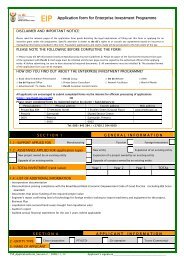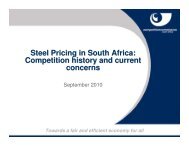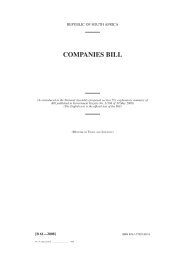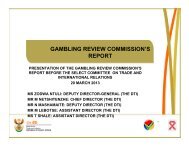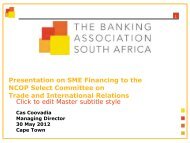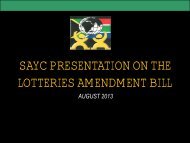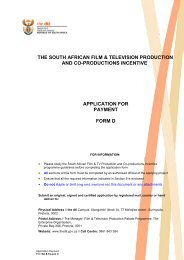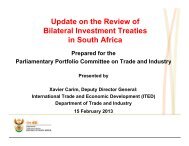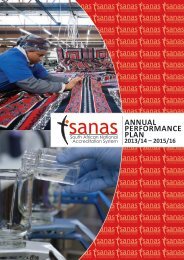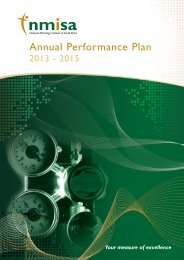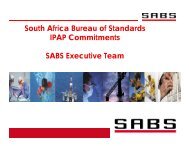Copyright Review Commission Report - ICT Law and Regulation ...
Copyright Review Commission Report - ICT Law and Regulation ...
Copyright Review Commission Report - ICT Law and Regulation ...
- No tags were found...
You also want an ePaper? Increase the reach of your titles
YUMPU automatically turns print PDFs into web optimized ePapers that Google loves.
Collecting societies in the UK all agree that the collective management of members’ rights is more effective if there is a singlecollecting society per repertoire. The representatives of the collecting societies were asked during the interviews tosubstantiate this preference. The reasons advanced were varied. It was noted that such arrangement promotesunderst<strong>and</strong>ing, transparency <strong>and</strong> accountability. Representatives that were interviewed also stated that it is much easier forusers to have one society to negotiate with – it lessens the burden. It also ensures consistency of approach <strong>and</strong> efficiency<strong>and</strong> the possibility of disputes are lessened. One representative noted that in markets where there are two societies, time<strong>and</strong> resources must be spent in addressing competitor issues.7.8. COMMUNICATION WITH MEMBERSBoth PRS <strong>and</strong> PPL maintain a useful website for members <strong>and</strong> users alike. These websites boast informative FrequentlyAsked Questions (FAQs) – see, for example, the FAQs for PRS available athttp://www.prsformusic.com/creators/wanttojoin/Pages/NewMemberFAQs.aspx.PPL offers services to its members beyond the UK borders. It notes on its website:In excess of 47 territories around the world have an equivalent organisation to PPL, collecting broadcasting <strong>and</strong> public performancerevenue <strong>and</strong> other sources of revenue which may not exist in the United Kingdom, such as private copying, rental, audio visualcommunication to the public <strong>and</strong> cable retransmission.As a result, during the last few years, PPL has set up a number of agreements with similar licensing organisations in other countries.We continue to develop these relationships <strong>and</strong> we are in constant talks to add to the list of territories <strong>and</strong> licensing organisations thatparticipate in the scheme (see http://www.ppl.com).7.9. COPYRIGHT INFRINGEMENTSThe Digital Economy Act (http://www.legislation.gov.uk/ukpga/2010/24/contents ) is an important law. One of the aims of theDigital Economy Act is to curb piracy of copyright works <strong>and</strong> the illegal downloading <strong>and</strong> reproduction of works through filesharing.7.10. OTHER ISSUESSection 144A of the CDPA 1988 provides for compulsory collective licensing of cable re-transmission rights in, inter alia,musical works a reception of wireless broadcasts from another state in the European Economic Area.The Committee recommends that collecting societies adopt ADR for the resolution of their disputes with copyright users <strong>and</strong>potential users, as well as disputes with members.The IPO has noted that the history of the PRT <strong>and</strong> <strong>Copyright</strong> Tribunal is one of disputes that have spiralled out of control,which have been marked by cost <strong>and</strong> delay. The <strong>Copyright</strong> Tribunal is seen as a desperate option. It ill serves the collectingsocieties <strong>and</strong> the licensees. The cost <strong>and</strong> delay are not intrinsic to the nature of the <strong>Copyright</strong> Tribunal (or the PRT), but for- 162 -



